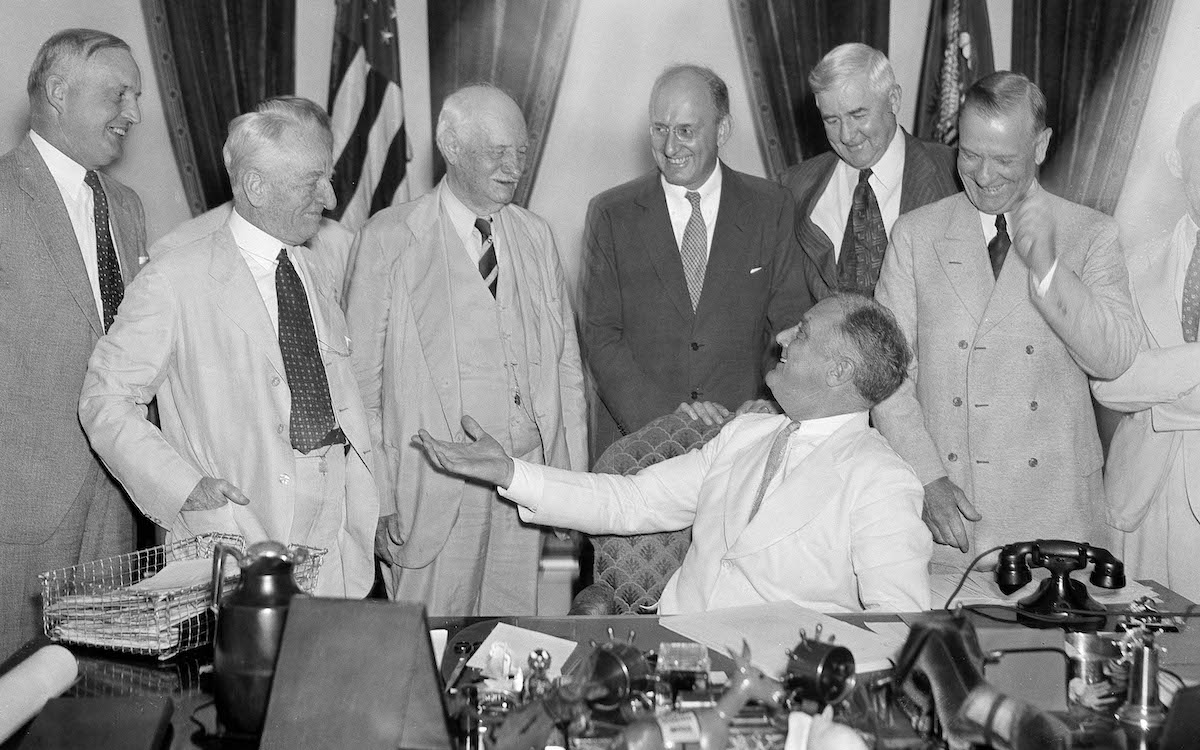The American Institute of Economic Research has published an anthology of critics of the New Deal, New Deal Rebels, complete with more than 50 brief commentaries and excerpts. The book is edited by contemporary economic historian Amity Shlaes, herself a prominent New Deal critic, whose The Forgotten Man is perhaps the most comprehensive work memorializing the mistakes of that era.
What makes this anthology profoundly unique, however, is that it is not a series of arguments from modern critics of the New Deal such as Shlaes herself and members of the Acton, Cato, and National Review orbit. Rather, the book has compiled contributions from those criticizing the New Deal during the New Deal. This extensive effort enables readers not merely to assess arguments on their own persuasive merit but with the benefit of hindsight. Indeed, if many of these critics’ assertions were controversial or unpersuasive to policymakers in the 1930s, the 80 years that have transpired since afford students of the era ample time to evaluate how positions crafted during the economic challenges of the era have held up. The results do not bode well for those who have romanticized the New Deal into an economic fantasy used to promote an entirely new conception of the state’s relationship to the economy.
Debating what has come to be taken as historical fact after it has been mythologized into public consciousness is no small task. The objective reality that the New Deal did not solve the Great Depression is at odds with the progressive aspiration for it to have done so. A historicism that lionizes Franklin Delano Roosevelt is one progressive priority in the New Deal debate, but an economic agenda that continues, decades later, to call for federal government intervention into business cycle disruptions remains the real matter at hand. In other words, New Deal critics are not arguing merely about history any more than progressive New Dealers are. The debate is about maintaining an operating assumption that centralizing economic policy provides a superior path to economic stability and prosperity. That assumption is not a consensus view today, no matter how much our betters want us to believe it is. And as this fantastic anthology demonstrates, it was not a consensus view in the 1930s either.
National expectations for what government should do in an economic crisis did change after the New Deal; consequently the distinction between government action in crisis and government action in non-crisis has been completely eroded. The legacy of the New Deal is not merely Keynesian policy prescription for intermittent periods of lagging aggregate demand but rather a wholesale acceptance of the federal government as responsible for the economic order. Central planning is the sine qua non of New Deal philosophy, and while the New Deal may have started out as a “chaos of experimentation” (Richard Hofstadter), it ended up as something much different. An analogy could be made to modern monetary policy: post–financial crisis “quantitative easing” may have begun in 2009 as a Bernanke experiment but it has since become deeply embedded in expectations of how our financial system should operate. The legacy of the New Deal is how experiments become policies and policies become prescriptions. As this anthology carefully documents, and heroic critics made clear repeatedly in real time, this conclusion was entirely predictable.
What makes this book eminently readable despite the high volume of contributions is the impressive diversification of perspective, style, and historical angle. Fifty-three essayists and policymakers from the 1930s all writing a criticism of 1930s public policy lends itself to the risk of monotony and redundancy. Yet Shlaes’ editorial savvy results in distinctive contributions: from congressional opposition to the famous Smoot-Hawley tariff bill, to John Maynard Keynes’ surprising criticism of FDR’s monetary policy, to Wendell Wilkie’s calling for the government to support business by doing nothing at all for business, to Garet Garrett’s attacking the idea of federal subsidies for artwork that defends federal subsidies. From academic economists to media pundits to elected officials, this anthology includes a wide array of authors offering a variety of critiques, all bound together by their fundamental disagreement with the wisdom of the age.
The diversity and readability of the contributions is not the only selling point. The bravery of policymakers who were FDR aides and New Deal advocates in writing of the failure of the policies and the mistaken aspirations of the effort is inspiring. Raymond Moley’s piece in this vein is alone worth the price of the book. Economic policies that fail to deliver as advertised today are inevitably propped up by the laws of non-falsifiability (i.e., Keynesian spending did not work because it needed to be even bigger, etc.). The demonstration of some contrition (not enough) out of the New Dealers is a historical anecdote that warrants our attention.
Ultimately, New Deal Rebels is a history book written by those who were living in the history being covered, with profound importance for the economic debate of our age. As progressives live in a permanent “New Deal” mindset, with the very language of that era used to advance a radical environmental agenda (the “Green New Deal”), and, sadly, many on the so-called New Right look to the intervening hand of the state as a partner in economic activity, the heroic opponents of the 1930s New Deal must be studied if we are to have a chance of stopping a 2030s newer New Deal reality.
Dismantling the legacy of the past 80–90 years will not be easy, but by studying the works that Amity Shlaes and AIER have put together in this anthology, perhaps we can accelerate our way to the wisdom of that renowned social commentator Will Rogers: “If you find yourself in a hole, stop digging.”

